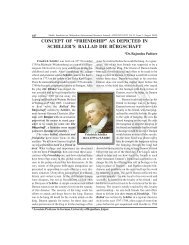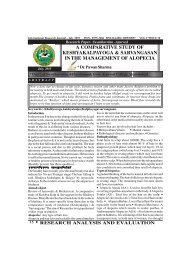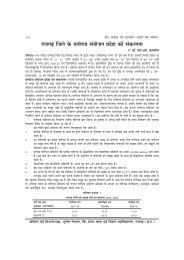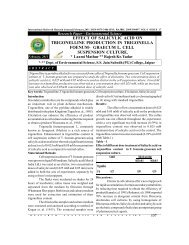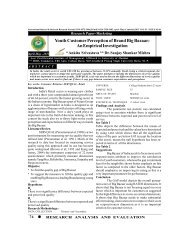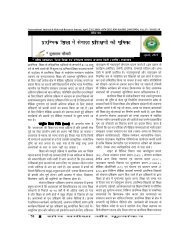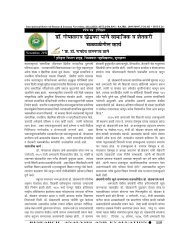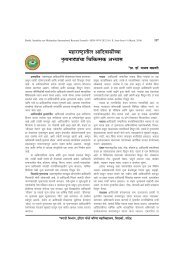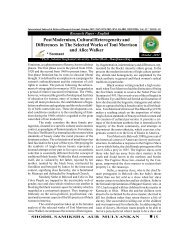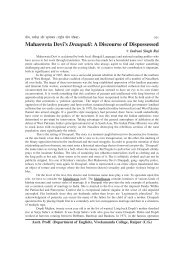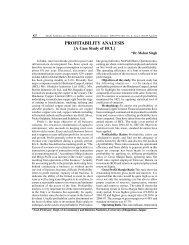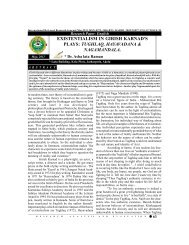tragedy in the novels of thomas hardy - international indexed ...
tragedy in the novels of thomas hardy - international indexed ...
tragedy in the novels of thomas hardy - international indexed ...
You also want an ePaper? Increase the reach of your titles
YUMPU automatically turns print PDFs into web optimized ePapers that Google loves.
International Research Journal , July 2010 ISSN- 0975-3486 RNI: RAJBIL 2009/30097 VOL I *ISSUE 10<br />
Research Paper - English<br />
TRAGEDY IN THE NOVELS<br />
OF THOMAS HARDY<br />
July, 2010<br />
* Rajesh Kumar<br />
* Assicate Pr<strong>of</strong>. Comm.Dept. Sant Gadge Maharaj Mahavidyalaya, Walgaom.<br />
* Research Scholor, S<strong>in</strong>ghania University,Rajasthan<br />
Introduction<br />
The term ‘<strong>tragedy</strong>’ is applied to literary and to<br />
dramatic representations <strong>of</strong> serious actions which<br />
eventuate <strong>in</strong> a disastrous conclusion for <strong>the</strong> protagonist<br />
(<strong>the</strong> chief character). More precise and detailed<br />
discussion <strong>of</strong> <strong>the</strong> tragic form properly beg<strong>in</strong> – although<br />
<strong>the</strong>y should not end – with Aristotle’s classic analysis<br />
<strong>in</strong> <strong>the</strong> Poetics. When we study any tragic work, it is<br />
essential to be kept <strong>in</strong> m<strong>in</strong>d <strong>the</strong> causes <strong>of</strong> disaster, <strong>the</strong><br />
emotional reaction <strong>of</strong> <strong>the</strong> audience, <strong>the</strong> writer’s view <strong>of</strong><br />
human nature and what type <strong>of</strong> persons are <strong>the</strong> victims.<br />
In <strong>the</strong> tragedies <strong>of</strong> Thomas Hardy, characters are noticed<br />
full <strong>of</strong> frustration; <strong>of</strong> broken lives; and <strong>of</strong> <strong>the</strong> pa<strong>the</strong>tic<br />
futility <strong>of</strong> human effort when it puts itself aga<strong>in</strong>st hostile<br />
faith. Hardy’s characters are dom<strong>in</strong>ated by mischance<br />
and malicious dest<strong>in</strong>y. The phrase ‘The president <strong>of</strong> <strong>the</strong><br />
immortals had ended his sport with Tess’ clearly shows<br />
<strong>the</strong> presence <strong>of</strong> supernatural power.<br />
The aims are clearly thwarted by ancient social<br />
prejudices scorn<strong>in</strong>g and repress<strong>in</strong>g a man’s ambitions;<br />
and by man’s own weakness which can be observed<br />
through <strong>the</strong> phrase ‘<strong>the</strong> <strong>tragedy</strong> <strong>of</strong> unfulfilled aims’. In<br />
<strong>the</strong> words <strong>of</strong> Robert Hudson and Edw<strong>in</strong> Arnold “The<br />
central <strong>the</strong>me is <strong>the</strong> <strong>tragedy</strong> <strong>of</strong> unrealized aims” 1 Even<br />
<strong>the</strong> characters are apparently aware <strong>of</strong> hostility. Man’s<br />
struggle is generally useless. The tragic force <strong>of</strong> Hardy’s<br />
<strong>novels</strong> is <strong>in</strong>evitably impaired. In <strong>the</strong> tragedies <strong>of</strong> Thomas<br />
Hardy, <strong>the</strong> play <strong>of</strong> an alien force can be easily observed<br />
controll<strong>in</strong>g <strong>the</strong> actions <strong>of</strong> a puppet. A struggle <strong>of</strong> man<br />
with <strong>in</strong>f<strong>in</strong>ite power and <strong>in</strong>different dest<strong>in</strong>y can easily be<br />
observed. “How I have tried and tried to be a splendid<br />
woman, and how dest<strong>in</strong>y has been aga<strong>in</strong>st me?” 2 The<br />
conflict <strong>of</strong> desires appears to be <strong>the</strong> basis <strong>of</strong> <strong>tragedy</strong>.<br />
Even <strong>the</strong> ethical significance is not at all observable.<br />
Man is usually placed aga<strong>in</strong>st a mysterious, spiteful<br />
power which limits his dest<strong>in</strong>y though <strong>the</strong> characters<br />
are not always aware <strong>of</strong> it. Thomas Hardy <strong>in</strong> his <strong>novels</strong><br />
besides hav<strong>in</strong>g a grudge aga<strong>in</strong>st <strong>the</strong> universe had a<br />
feel<strong>in</strong>g <strong>of</strong> resentment aga<strong>in</strong>st <strong>in</strong>justice <strong>of</strong> which man is<br />
victim. “He (Hardy) himself proposes no remedy,<br />
suggests no escape – his bus<strong>in</strong>ess not be<strong>in</strong>g to deal <strong>in</strong><br />
notstrums <strong>of</strong> social <strong>the</strong>rapeutics. He is content to make<br />
7<br />
123456789012345678901234567890121234567890123456789012345678901212345678901234567890123456789012123456789012345678901234567890121<br />
123456789012345678901234567890121234567890123456789012345678901212345678901234567890123456789012123456789012345678901234567890121<br />
123456789012345678901234567890121234567890123456789012345678901212345678901234567890123456789012123456789012345678901234567890121<br />
123456789012345678901234567890121234567890123456789012345678901212345678901234567890123456789012123456789012345678901234567890121<br />
123456789012345678901234567890121234567890123456789012345678901212345678901234567890123456789012123456789012345678901234567890121<br />
his readers pause and consider and pity” 3 An evil power<br />
rul<strong>in</strong>g this universe thwarts every effort <strong>of</strong> man to get<br />
happ<strong>in</strong>ess. Events are <strong>of</strong>ten full <strong>of</strong> agony. Co<strong>in</strong>cidences<br />
have been abundantly used which ironically turn out<br />
unlucky.<br />
This is Hardy’s assessment <strong>of</strong> mank<strong>in</strong>d which shows<br />
<strong>the</strong> <strong>in</strong>fernal malice which rules <strong>the</strong> world – <strong>the</strong> <strong>in</strong>genious<br />
mach<strong>in</strong>ery controlled by <strong>the</strong> gods for reduc<strong>in</strong>g human<br />
possibilities to a m<strong>in</strong>imum. Man’s goodness faces evil<br />
which seems to be omnipotent. In his stories, Thomas<br />
Hardy has an <strong>in</strong>dictment to argue.<br />
The problems are set out <strong>the</strong> tragic conclusion<br />
<strong>of</strong> which is <strong>in</strong>escapable. Hardy <strong>in</strong>terrupts his narrative<br />
with <strong>in</strong>dignant, outbursts and denunciations. His <strong>novels</strong><br />
exceed <strong>the</strong> scope <strong>of</strong> <strong>tragedy</strong>. Characters appear without<br />
any doubt to embody <strong>the</strong> elemental forces aga<strong>in</strong>st which<br />
<strong>the</strong>ir struggle is totally useless. The odds have been<br />
overloaded aga<strong>in</strong>st characters <strong>in</strong> his <strong>novels</strong>. A series <strong>of</strong><br />
chances and co<strong>in</strong>cidences frequently thwarts human<br />
happ<strong>in</strong>ess. Happ<strong>in</strong>ess is an occasional episode <strong>in</strong> a<br />
general drama <strong>of</strong> pa<strong>in</strong>. Mostly characters <strong>in</strong> Hardy’s<br />
<strong>novels</strong> are wretched, miserable and <strong>in</strong> a state <strong>of</strong><br />
damnation. In <strong>the</strong> words <strong>of</strong> J.H. Miller,<br />
“The goal <strong>of</strong> <strong>the</strong> desire is to f<strong>in</strong>d that someth<strong>in</strong>g<br />
miss<strong>in</strong>g” 4 It is apparent that Hardy is a critic <strong>of</strong> human<br />
condition <strong>in</strong> philosophical sense. The mutual strife <strong>of</strong><br />
<strong>the</strong> sexes, <strong>the</strong> struggle for existence and for happ<strong>in</strong>ess<br />
and <strong>the</strong> o<strong>the</strong>r hurdles obsess<strong>in</strong>g <strong>the</strong> human path are<br />
normal. It is also clearly ironical that Hardy’s conception<br />
is tragic as far as life is concerned. There is hardly any<br />
opportunity <strong>of</strong> escape from any conflict. Man is not<br />
able to subdue his own <strong>in</strong>subord<strong>in</strong>ate nature and a<br />
mysterious spiteful power places snares <strong>in</strong> his path. A<br />
crucial and prom<strong>in</strong>ent role <strong>of</strong> chance and co<strong>in</strong>cidence<br />
is properly observable <strong>in</strong> <strong>the</strong> <strong>novels</strong> <strong>of</strong> Thomas Hardy<br />
which clearly becomes <strong>the</strong> cause <strong>of</strong> <strong>tragedy</strong>.<br />
Accord<strong>in</strong>g to J.I.M. Steward, “Always <strong>in</strong><br />
Hardy it is certa<strong>in</strong> that <strong>the</strong> <strong>in</strong>cidence <strong>of</strong> fatality with<strong>in</strong><br />
<strong>the</strong> general operation <strong>of</strong> chance will be higher than we<br />
are commonly prepared to accept <strong>of</strong> its be<strong>in</strong>g <strong>in</strong> nature.<br />
Why does he thus so <strong>of</strong>ten seem to aga<strong>in</strong>st his<br />
123456789012345678901234567890121234567890123456789012345678901212345678901234567890123456789012123456789012345678901234567890121<br />
123456789012345678901234567890121234567890123456789012345678901212345678901234567890123456789012123456789012345678901234567890121<br />
123456789012345678901234567890121234567890123456789012345678901212345678901234567890123456789012123456789012345678901234567890121<br />
RESEARCH ANALYSIS AND EVALUATION
International Research Journal , July 2010 ISSN- 0975-3486 RNI: RAJBIL 2009/30097 VOL I *ISSUE 10<br />
characters with loaded dice” 5 Many factors such as patterns <strong>of</strong> his <strong>novels</strong> which later jo<strong>in</strong>ed with<br />
Dest<strong>in</strong>y, nature, supernatural power, social customs complicated plots <strong>in</strong> <strong>the</strong> co<strong>in</strong>cidences <strong>of</strong> (Hardy’s)<br />
and <strong>the</strong> own responsibility <strong>of</strong> characters appear to <strong>novels</strong>. He is much conv<strong>in</strong>c<strong>in</strong>g as far as <strong>the</strong> scenes <strong>of</strong><br />
operate toge<strong>the</strong>r and <strong>the</strong> work<strong>in</strong>g <strong>of</strong> all <strong>the</strong>se factors death or misfortunes are concerned. His creative faculty<br />
creates a sense <strong>of</strong> mystery <strong>of</strong> life; a sense which is is aroused to it’s full activity. In <strong>the</strong> words <strong>of</strong> Noorul<br />
created <strong>in</strong> every tragic work. A clash <strong>of</strong> wills and a Hasan, “This novel is actually fable <strong>of</strong> <strong>the</strong> barrenness” 7 .<br />
dispute <strong>of</strong> ambitions among many characters create CONCLUSION:<br />
dilemma without any way for outside where no An em<strong>in</strong>ent impact on <strong>the</strong> course <strong>of</strong> events is<br />
understand<strong>in</strong>g is possible.<br />
exercised through <strong>the</strong> unneglectable role <strong>of</strong> many<br />
“I am better educated than you – and I don’t factors (which cause <strong>tragedy</strong>) which is almost hard to<br />
love you a bit: That is my side <strong>of</strong> <strong>the</strong> case. Now yours: believe and even Thomas Hardy is criticized for it. It is<br />
you are a farmer just beg<strong>in</strong>n<strong>in</strong>g, and you ought <strong>in</strong> also genu<strong>in</strong>ely ironical that Hardy had a negative<br />
common prudence” 6 It is fate which makes it impossible thought about life that man is born to suffer and to be<br />
for characters to enjoy harmonious relationship. But unhappy. All <strong>the</strong> characters are made to suffer. His<br />
fate shows it’s power <strong>in</strong> <strong>the</strong> form <strong>of</strong> chances and conception <strong>of</strong> life is undoubtedly pa<strong>the</strong>tic. His critical<br />
co<strong>in</strong>cidences. In Thomas Hardy’s <strong>novels</strong>, <strong>the</strong> tragic attitude towards <strong>the</strong> world he has depicted is<br />
pathos <strong>of</strong> humanity is caught between happ<strong>in</strong>ess and unbelievable. Hardy piles up <strong>the</strong> agony to such an<br />
<strong>the</strong> harsh limitation <strong>of</strong> facts. A philosophic fatalism, extent that it excites horror and defeats even <strong>the</strong> aim <strong>of</strong><br />
too, goes hand <strong>in</strong> hand. Tragedy is noticed <strong>in</strong> <strong>the</strong> ironic <strong>tragedy</strong>.<br />
R E F E R E N C E<br />
1. Robert Hudson & Edw<strong>in</strong> Arnold : A Critical Study: Thomas Hardy, Anmol Publications Pvt. Ltd., 2005, P. 51 2. The Return<br />
<strong>of</strong> The Native: Thomas Hardy Oxford University Press, 2004: Explanatory Notes by : Nancy Barr<strong>in</strong>eau, P. 359. 3. R.G. Cox.<br />
ed. Thomas Hardy: The Critical Heritage, P. 202 4. Miller, J. Hillis Fiction and Repitition: Seven English Novels. Cambridge:<br />
Harvard (U.P.) 1982, P.167 5.J.I.M. Steward English Studies (1948) P. 19 6. Thomas Hardy: Three Pastoral Novels Edited<br />
by R.P. Draper(Macmillan Education Ltd. 1987) P. 131 7. Noorul Hasan: Thomas Hardy, The Sociological Imag<strong>in</strong>ation<br />
Macmillan India Ltd., 1982, P. 14<br />
8<br />
fjlpZ ,ukfyfll ,.M boSY;q,’ku



